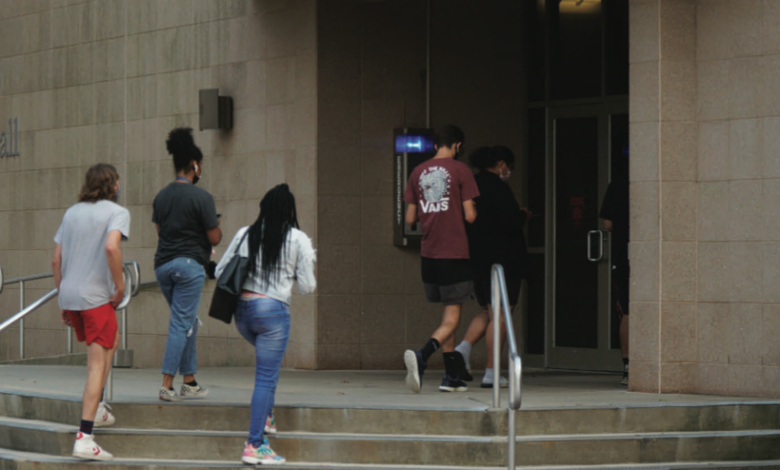
Clean eating: dining difficulties on campus
By Kaitlyn McCormick
Many students today are turning to vegetarian and vegan diets due to a heightened focus on sustainability and personal health. The restrictions and substitutions involved with these diets may be easier to achieve in an off-campus setting, seeing as plant-based options have become more available in recent years.
However, the Rider dining facilities still have a lot of work to do to satisfy vegetarian and vegan students, and this will be contingent on students making the effort to communicate their needs and wishes.
The reason for diet shifts
There are many reasons to cut out meat or go plant-based altogether. Sophomore psychology major Jenna Rosa explained that she was raisedvegetarian and switched to veganism with her mom around three years ago. Rosa said that while she chose veganism in part as a choice against animal cruelty, it’s also just a “healthier lifestyle” and “very good for the body.”
Senior English major Michaela Hamaid, who is vegetarian, had similar reasons for cutting meat out of her diet around eighth grade, starting with a passion for animal rights, now evolving into the overall positive environmental and health impacts that accompany the diet.
Some students, like sophomore biochemistry major Emma Zinser, who was influenced by an environmental ethics class she took at Rider, have only recently decided to switch to a vegetarian diet.
Eating green on campus
Sticking to a vegetarian and vegan diet on campus, however, has proven difficult for many students. Hamaid, for example, opted out of Rider’s dining services because of prior negative experiences with the vegetarian options at the university.
Hamaid said, “My freshman year, when I went home for the first time I had lost so much weight because there wasn’t enough options for me to eat at Daly’s [Dining Hall] and Cran[berry]’s…the stuff that was there was not nutritious enough.
“… This year I got [a dorm with] a kitchen, so I was just like, you know what, I can make things that are more nutritious than Daly’s has to offer me.”
Rosa, who pays for a meal plan, has found herself struggling to find filling options on campus.
Rosa said that while “some days the vegan food is great, and it’s plentiful,” the end of the week and into the weekend become harder to find full mealoptions.
“There’s like veggie things, but there’s no protein. …There is the self- serve tofu and the self-serve chickpeas [in the salad bar], but there is cross- contamination with egg and cheese. …I will get really sick if I have that,” Rosa said.
Maintaining these specific diets have caused many students to employee a high level of flexibility to the options that are available to them, but it hasproven difficult at times.
The need for more diverse meal options
It’s only natural that the amount of vegetarian and fully vegan options available will be far more limited than those for students with no dietary restrictions. But there is still room for major improvements. Many students commit to a vegan diet by choice, but that doesn’t make their dietary needsany less serious.
Rosa maintained that the biggest issue is the lack of consistent vegan protein options.
“If I don’t get any protein, I feel so lethargic. So having that protein is crucial for my health,” said Rosa
Hamaid also mentioned the scarcity of vegetarian and vegan options.
“Even when Daly’s does have stuff, they run out of it really quick. So, if you’re not there when they have it, that’s it, you’re eating pasta for the day,”she said.
Campus dining options, like Daly’s, have made a lot of progress in providing plant-based options, but students have evidently still found themselves struggling to have their needs consistently met. This issue is crucial for students living on campus who are required to purchase meal plans ranging from $2,795 to $2,875 per semester.
Zinser said, “I pay for unlimited [meal] swipes, but I always have to end up spending Bronc Bucks or additional money to get the food that I need to eat.”
Expanding dining services
While the consensus from many students has proven that maintaining a vegetarian or vegan lifestyle on campus can be challenging, the dining services team and campus dieticians have been working vigorously to expand meal options.
Jena Cantwell, Gourmet Dining’s director of community relations and a vegetarian herself stressed that while Rider’s dining services have been making strides in providing a rotating menu of vegan and vegetarian options including entree proteins, desserts, snacks and items accessible in the Teaching Kitchen at Daly’s, the dining team is always looking for ways to better serve students.
Cantwell said, “We continue to solicit feedback from students through so many different outlets. Through social media, we do open food forums, we do social media posts, we do tablings on campus.”
Rider’s campus dietician Amy Schaub said, “We’re here to serve the students. …We’re really willing to get them anything that they would like within reason.” Vegetarianism and veganism are more than just trending or fad diets — they’re lifestyles. Rider’s dining services understand that students deserve to have their needs met with the seriousness of any other dietary restriction, but this will continue to require a combined effort of communication between students and the staff dedicated to creating viable and fulfilling meal options for all students.



